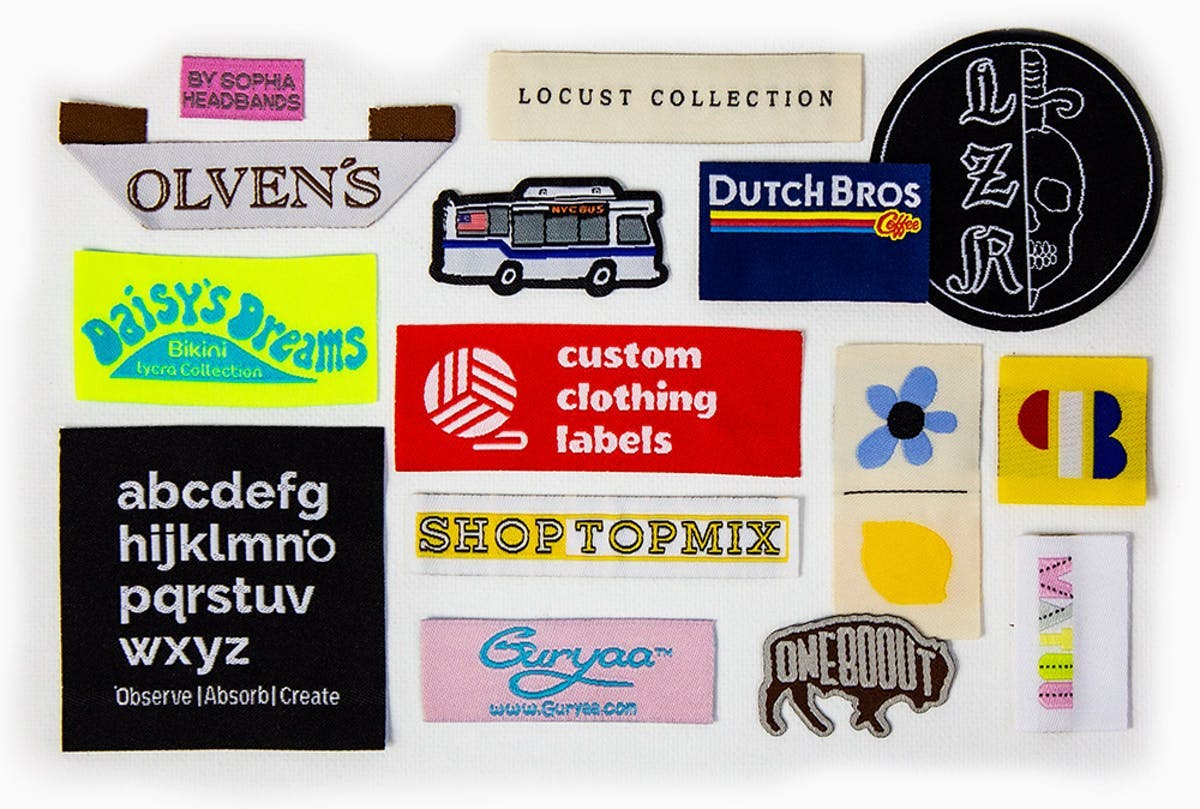Having a high quality label is key to brand identity. Woven brand labels are the first choice for both large-scale brands and smaller-scale makers throughout the world because of their quality, durability and design flexibility.
Woven labels are produced on a jacquard loom. This specific loom weaves threads of different colors together to match the intended design of the label. This technique produces a high-quality, permanent label that will last the lifetime of nearly any garment.
How are Woven Clothing Labels Made?
Most woven labels are made up of 100% polyester yarn. Polyester is a good choice because it is strong, lustrous, and available in an endless variety of colors. Polyester yarn can withstand all types of laundering , is colorfast, and will remain smooth and flat within the garment.
Cotton woven labels are a less common option. They’re ideal for anyone committed to using only natural fibers and following sustainable practices. There are more limitations and fewer color options with cotton woven labels, however well-made cotton woven brand labels still look great and are highly durable.
When choosing a woven label, check for any information about the denier of the yarn being used in the weaving process. This denier number could range anywhere from 30-100. The higher the number, the thicker the thread being used. Generally, low denier threads produce a better quality label as more threads are used.

The difference between Damask, Satin and Taffeta
If you’re going with a woven brand label, you may notice Damask, Satin, or Taffeta options when ordering. Each option produces a slightly different label finish, so they are important terms to understand to get the most out of your custom label order. Let’s see which option is best for you.
Damask Woven Labels
A Damask weave is the most popular choice for high-end woven labels. It’s created using contrasting weave structures on the warp and weft axes. This method uses high numbers of finer, low denier threads to create a high density pattern and finished label. That means designs can be more intricate and detailed due to the higher number of fine threads being used. Damask woven labels are also the softest woven option. Their lustrous finish is soft against the skin, making them a great choice for garment labels.
Satin Woven Labels
Satin weaving techniques create an eye-catching, high-shine finish. Satin labels are delicate and have a particular look to them, perfect for both formal wear or an item that calls for a more vintage feel. Unfortunately, their distinctive weave pattern means that finer design details are unable to be used, though lettering comes through very well.
Taffeta Woven Labels
Taffeta labels do not feel or look as high quality as a damask or satin, but they are a great low cost solution. A taffeta label is thinner than a standard woven label, so they’re ideal for labels for clothing that are sewn into a seam. It’s common to find damask or satin labels that use taffeta weaving for the seam allowances, which creates a label that has a high quality finish, but with a less bulky taffeta weave on the parts sewn directly into the garment.
The Benefits of Woven Clothing Labels
A woven label will give your products the professional finish they deserve. They are used throughout the fashion and textile industries to create long lasting labels for any garment or item. Here are just some of the reasons why a custom woven label will improve your work.
- High Quality: Woven labels are one of the highest quality labels available. They are used by high-end designers because of their soft and lustrous finish.
- Durability: They are long-lasting and will continue to look great after years of wear. Woven labels won't fray or fade over time, so your label will always look as good as the day it was sewn into your product.
- Customizability: Woven labels can be endlessly customized. You can choose from a range of different finishes with yarns that are all colorfast. A high level of detail can be achieved using just a few colors.
- Soft to the touch: Custom woven labels are soft around the edges without feeling flimsy. This is perfect for applications inside garments as they will sit smoothly without irritating the wearer.
The Limitations of Woven Clothing Labels
Unfortunately, not all designs will translate to a woven label. If that’s the case, a printed label should do the trick. To find out, read about some of those limitations.
- Color limits: There is a maximum of 12 colors in any single woven label—this includes any shading in a design as well as black and white. If your label has highly colorful images or color gradients this will either need to be scaled back to fewer colors or an alternative method such as digital printing might be more suitable.
- Ultra-fine text and detail: If your label has multiple rows of small text or laundry symbols, you might want to consider a printed label. Woven labels work great with larger text, like a brand name, but if you need a lot of text, custom printed labels are your best option for readability.
- Higher cost: Woven labels can be a bit more expensive as weaving requires specialized weaving design, handpicked yarn and sometimes multiple runs to achieve the right result. All in all it takes more time to produce, with higher setup costs.
